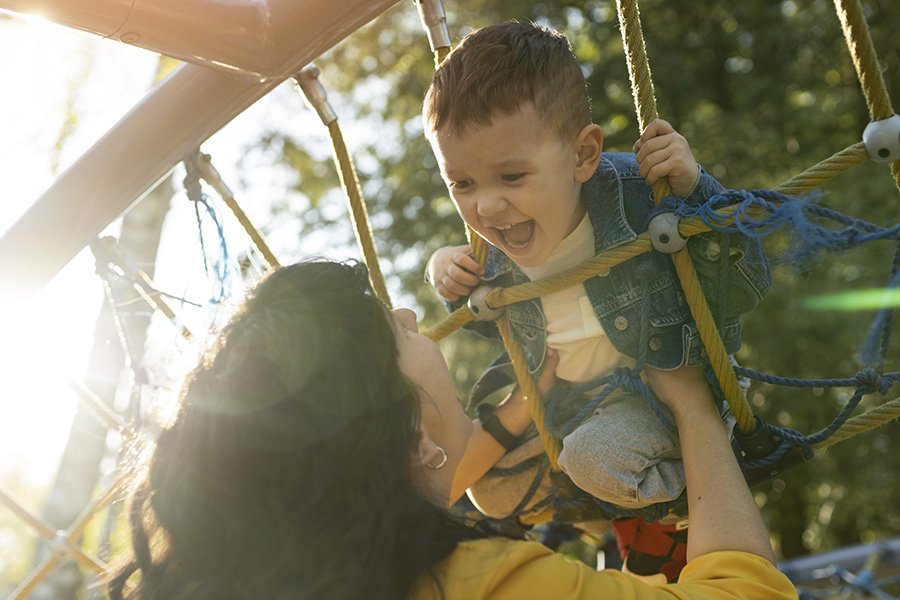In a world where screens dominate and schedules are packed with structured activities, outdoor playgrounds offer a vital space for children to grow, learn, and thrive. These vibrant, open environments are more than just a place to burn off energy — they are essential to a child’s physical, cognitive, emotional, and social development. From building resilience to boosting creativity, the benefits of outdoor play are both wide-reaching and scientifically supported.
Physical Benefits: Strength, Balance, and Coordination
One of the most immediate and visible advantages of outdoor playgrounds is the physical development they promote. Climbing, jumping, swinging, and running help children build strong muscles and improve their balance and coordination. Unlike indoor play, outdoor activities typically involve more vigorous movement, which supports cardiovascular health and overall fitness. Children who engage regularly in outdoor play are more likely to develop healthy habits that last a lifetime.
Importantly, outdoor environments also expose kids to varying terrain and unpredictable conditions. This helps develop their motor planning skills, agility, and spatial awareness in ways that indoor environments simply can’t replicate. Whether navigating a slippery slope or climbing a rope ladder, each challenge hones their physical abilities.
Risky Play Builds Resilience and Confidence
Contrary to what some may think, a little risk in play is not only safe — it’s beneficial. Risky play, such as climbing high structures or balancing on uneven surfaces, allows children to assess danger and make decisions. According to pediatric experts, shielding kids from all risks can actually hinder their ability to cope with challenges and stress later in life.
By learning how to judge risk and explore their physical limits, children develop self-confidence and emotional strength. They discover what they’re capable of, and even when they stumble, the experience teaches perseverance and problem-solving. Outdoor playgrounds offer a controlled environment where children can safely push boundaries and build essential life skills.

Cognitive and Creative Development
Playgrounds aren’t just about movement — they’re also powerful platforms for learning and imagination. Free outdoor play stimulates the brain in unique ways, encouraging curiosity and creative thinking. Whether children are inventing new games, pretending the slide is a dragon’s back, or negotiating the rules of a make-believe world, they are engaging in complex cognitive tasks that support language, memory, and problem-solving skills.
In unstructured outdoor environments, kids are also free from the rigid expectations often found in classroom settings. This autonomy allows them to explore interests at their own pace, which promotes intrinsic motivation and active engagement. These experiences contribute to stronger executive functioning — the mental skills that help us plan, focus, and achieve goals.
Social Growth Through Peer Interaction
Playgrounds are natural hubs for social development. They bring children together in shared spaces where they learn to cooperate, resolve conflicts, and build friendships. These early social interactions are critical for developing empathy, communication skills, and emotional intelligence.
Outdoor play also encourages mixed-age interactions, which can be especially beneficial. Younger children often look up to older peers and learn by observing, while older children practice leadership and nurturing skills. This dynamic fosters a strong sense of community and belonging, which boosts self-esteem and emotional well-being.
Mental Health and Well-Being
Spending time outdoors has been shown to reduce stress and anxiety in children. Natural light, fresh air, and open spaces have a calming effect on the nervous system, helping kids feel more relaxed and focused. Exposure to nature also supports mood regulation and has been linked to decreased symptoms of attention-deficit disorders.
Moreover, outdoor play gives children a chance to disconnect from digital devices and overstimulation. It invites mindfulness, presence, and joy — all of which are key ingredients in a healthy, balanced childhood.
Encouraging a Lifelong Love of Movement
Children who enjoy outdoor play from an early age are more likely to remain active throughout their lives. The joy of movement, discovery, and freedom that playgrounds offer can lay the groundwork for a lifelong love of physical activity and nature. As they grow, these early experiences can influence their approach to health, leisure, and community engagement.
Conclusion: A Vital Space for Growing Minds and Bodies
Outdoor playgrounds are far more than entertainment — they are essential tools for raising well-rounded, resilient, and happy children. By providing opportunities for physical exertion, imaginative exploration, social connection, and emotional growth, playgrounds support every facet of child development. In an age where structured routines and digital distractions dominate, the simple act of playing outside remains one of the most powerful ways to nurture a child’s full potential.
Parents, educators, and communities all have a role to play in preserving and promoting outdoor play spaces. Because every child deserves the chance to climb higher, run faster, imagine bigger — and grow stronger in every way.


